The Last Dinner Party approached their debut album, Prelude to Ecstasy, in an anachronistic way. For that matter, they built their whole career in a way more fit for bands from the ’60s and ’70s than the 2020s. The group—which consists of vocalist Abigail Morris, keyboardist Aurora Nishevci, guitarists Emily Roberts and Lizzie Mayland, and bassist Georgia Davies—wanted to retain some mystique, some buzz, some excitement. When they formed in 2021, they began rehearsing and playing shows, writing songs in their practice space with the intention of performing them live. A SoundCloud sensation causes a buzz, but The Last Dinner Party wanted to become something more; they wanted to define a generation of bands, to be the idols like the groups they would blare all day long while growing up outside of London. With Prelude to Ecstasy, that vision is clear.
The songs that make up this debut were completed over a year ago, but they were initially written and demoed before that, when the band decided to make a run at playing music professionally. The five friends met at university, quickly realizing that favorite bands and an angst toward the mundanity of after school jobs were shared. Alongside early demos came mood boards, with the band spending hours on end in pubs discussing the musical, visual, and aesthetic aspects of The Last Dinner Party. To see them live is to witness this attention to detail come marvelously to life—from the intricacy of arrangements, to the gothic-chic stage design, to the way Morris turns the show into punk-rock opera.

Creative Director/Styling Assist: Miranda Hammer. Photography Studio: Brenton LaBrie
Both on stage and in person Morris is the de facto bandleader, but it’s clear that The Last Dinner Party is a democratic enterprise. It’s not lost on us on a chilly November day at the Bowery hotel’s Gemma eatery that instead of a dinner party, we’re at an empty Italian restaurant likely using all of the gluten free crust at 2:45 p.m. local time. There’s a joke in there somewhere about a late-lunch party, but with a sold out show at the Bowery Ballroom in a few hours, a new contract as the next great rock hope for Island Records, and an ascent that would suggest TikTok buzz, algorithmic playlist optimization, and relentless inundation of modern marketing tactics, there’s simply no time to waste on a punchline.
After a morning at Urban Outfitters (“We like to find the local-only gems,” quips Davies), the band spends its first full day in New York City like the rest of us: perplexed at why all the restaurants are so expensive and so empty. There simply have to be better ways to operate businesses, but with the fat cats at Island opening the coffers for prosciutto arugula pizzas, such fascination with the modern restaurant industry gets tabled and we begin to discuss the origins of The Last Dinner Party.
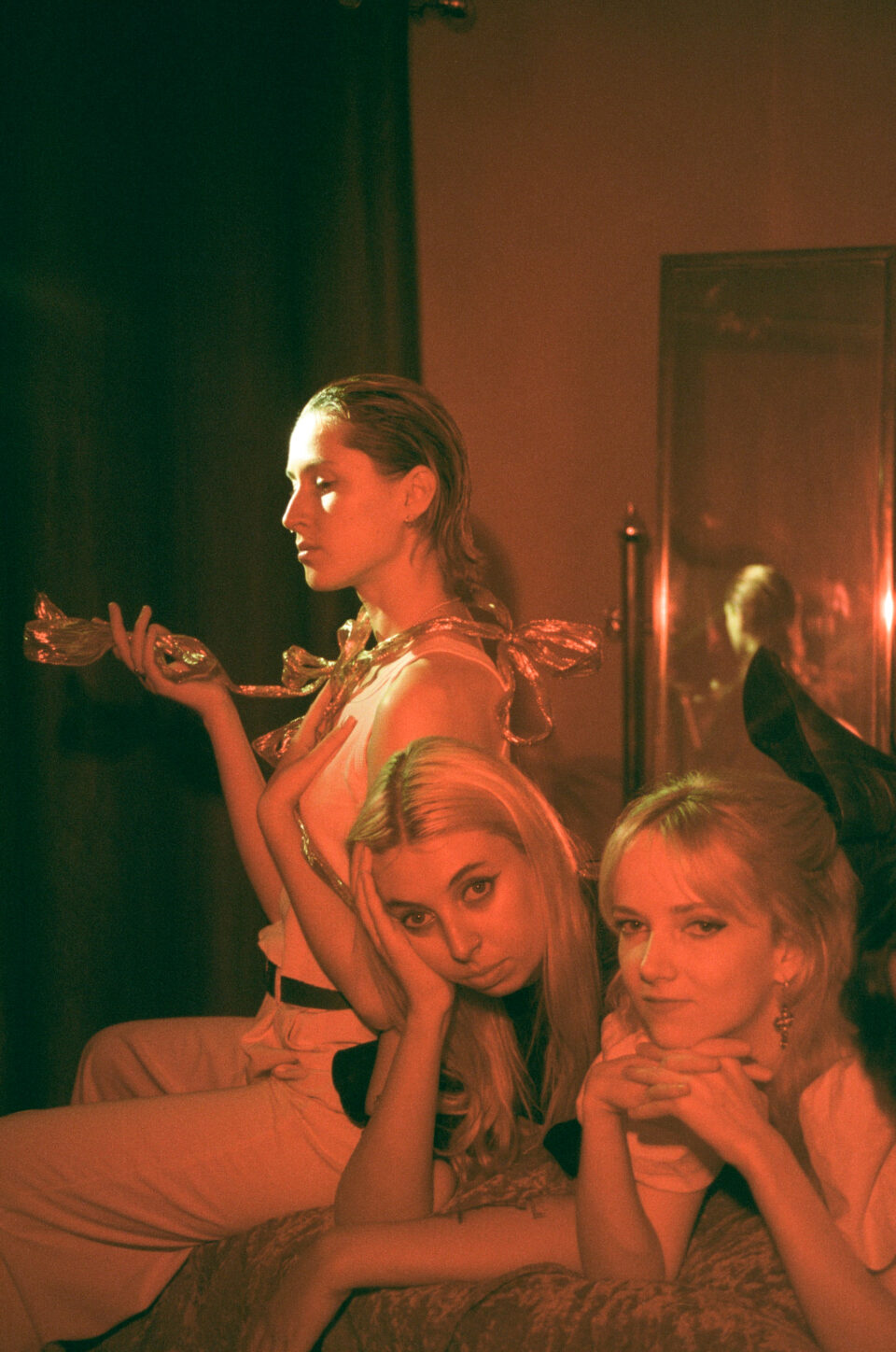
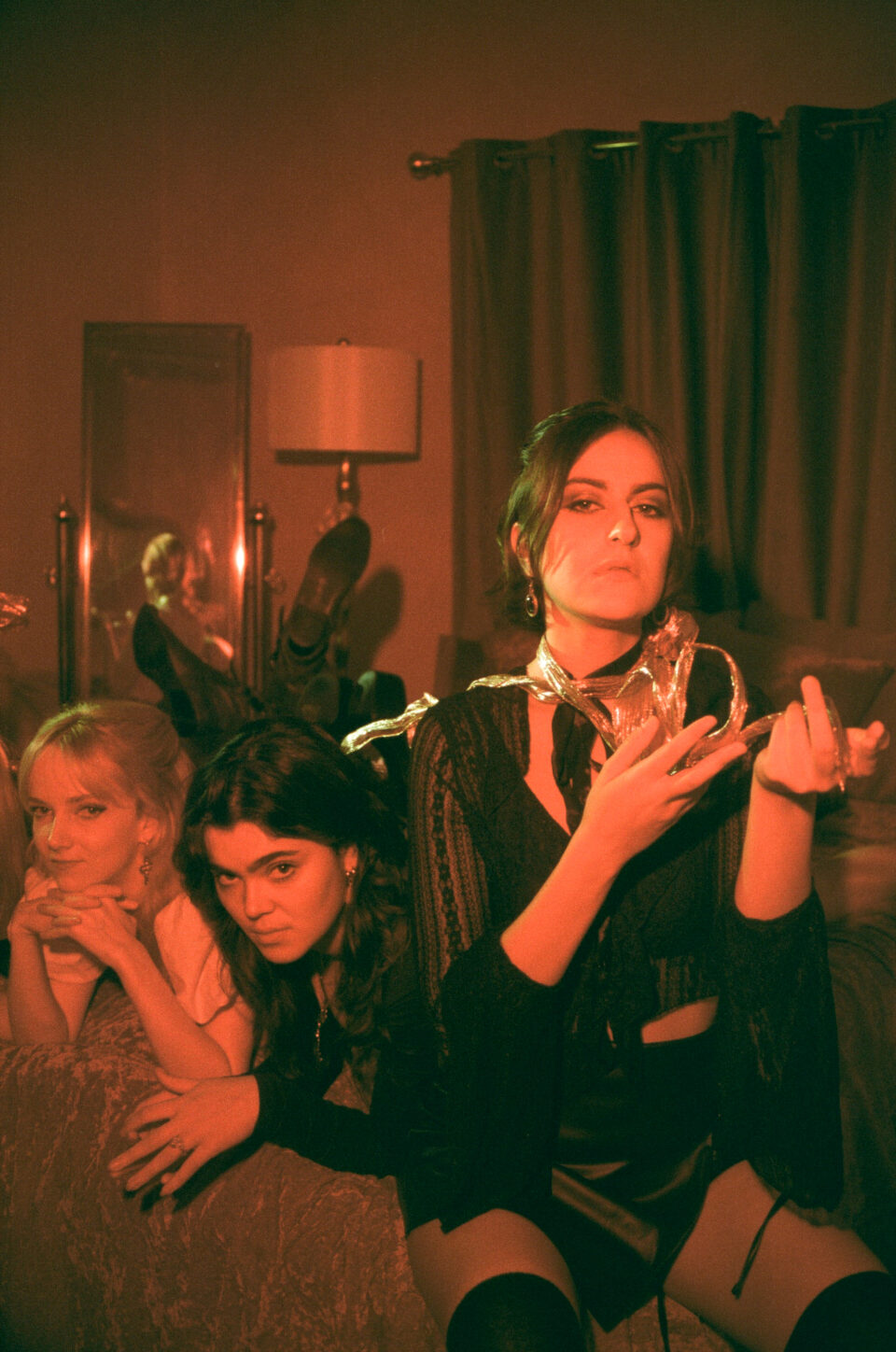
The first time the group knew they were doing something more important than just playing gigs that bridged the periods between jobs, sleep, and classes was when music attorneys started sending DMs to the band’s Twitter account. “We might need a lawyer,” Mayland remembers thinking. The local gigs were piling up and the gang scored a coveted slot opening for Walt Disco—a band they respected musically and a group whose path to success they could conceivably follow. But even with the mood boards, late night conversations, and relentless rehearsing, the band never really envisioned the sort of success that’s led them to playing their first NYC show in front of a sold-out crowd who knew lyrics to songs they had yet to release.
The band attributes at least some of their success to a mid-pandemic audience eager to rediscover live music. With a handful of songs they’d been honing since the early days of lockdown, they reemerged to a world excited by the prospects of seeing live music on a stage again, nevermind the fact that the band they would witness had an arsenal of art-rock masterpieces. “We got so lucky with the world we were born into, because people were really looking for a community and scene,” Abigail Morris explains. “Everyone was so broken from the pandemic, and we became a part of a world that was cherishing face-to-face interaction. People were really sick of not going out and not feeling part of a live scene. After a few shows, we started causing a bit of buzz, but you couldn’t hear our music [elsewhere]. You had to buy a ticket and see us live.”
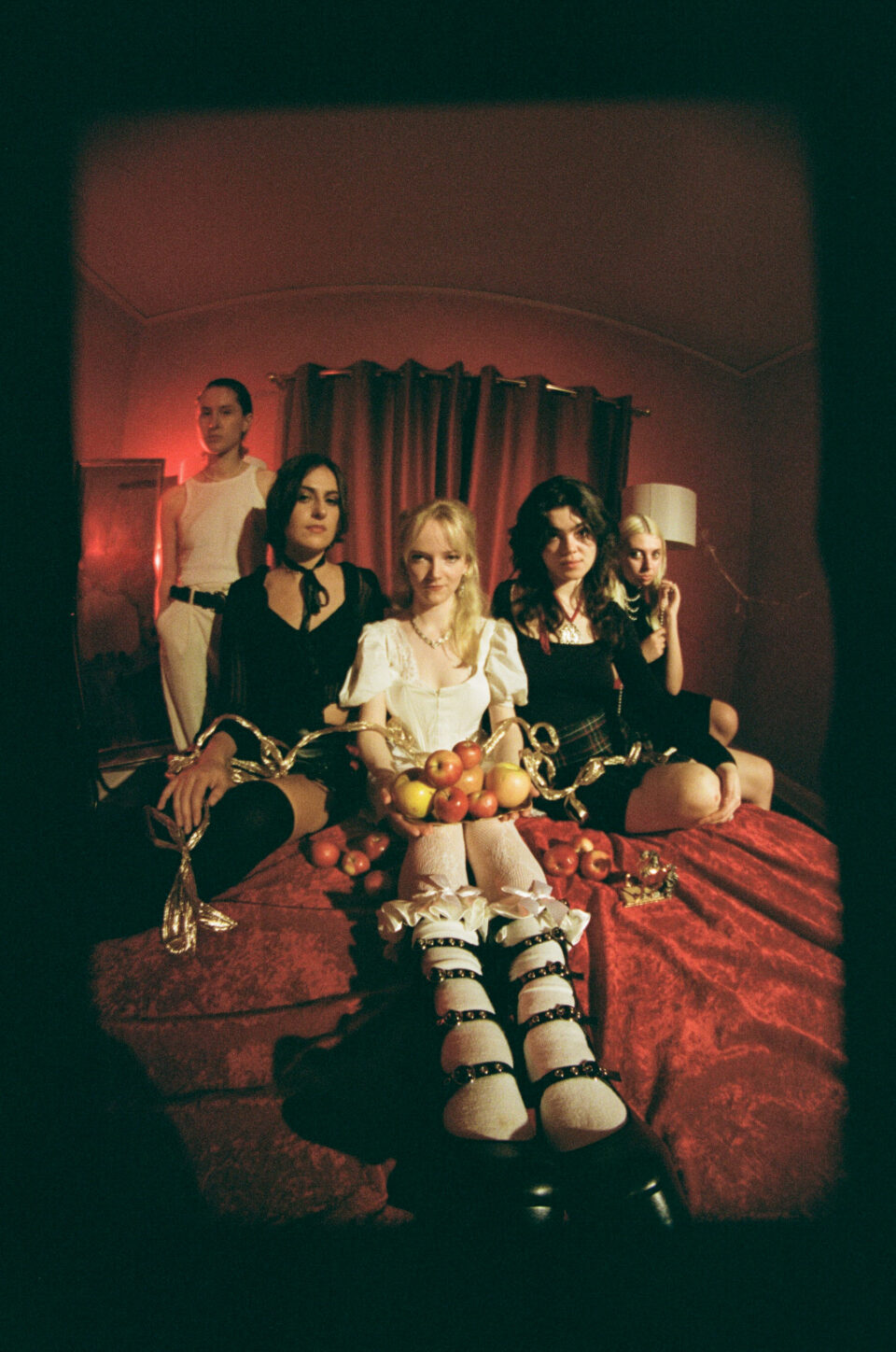
“Going to gigs was such an integral part of all of our musical experiences and our friendships. We had to base this band around the live experience.” —Aurora Nishevci
The band never had an intentional strategy of becoming a known live band before hitting the studio, but some of their favorite acts—Black Country, New Road; Black Midi—had built their fan bases in a similar way. In London, there was an ecosystem for this sort of success. They were allowed to be patient and get better, to build a fanbase that could grow with them in a way that felt organic and connective. The live format seemed like the ideal place to build their songs, because as a five piece they grew accustomed to sharing their ideas part and parcel with individuals, each member working to flesh out an idea shown to them by another bandmate. “I’m scared to show everybody my ideas at the same time, so we would have a few people working on one song, a few people working on another,” says Georgia Davies. “By the time we were ready to share what we were doing, the songs were in strong places.”
With a batch of demos that had been road tested and beloved by the London fans who heard them, the band took a chance and inked a major-label record deal, a decision that became easy when they saw the opportunities an expanded budget could afford. First and foremost? The group recruited James Ford to work on the album, a figure equally well known as a member of Simian Mobile Disco and The Last Shadow Puppets as he is for his production work with Arctic Monkeys, Blur, and, soon enough, The Last Dinner Party. “It was because of James that our first time ever in a professional studio wasn’t intimidating,” Morris explains. “He’s just the kindest, calmest, best man in music. He made us feel like we deserved to be there, which meant everything.”

No producer would take a chance on working with a band they didn’t think deserved to be there, but the experience could have been a lot different—a lot worse. “Even after we decided to work with him, he could’ve been swinging his shit around, saying stuff like, ‘I’m gonna make you stars’ or whatever. But he told us that we knew what we were doing.” That meant everything to Morris. “That’s such a gift to give to a band just starting out. We didn’t really know what was happening, but he let us find our way.”
With a room full of toys and every bit of studio magic at their disposal, the band was tempted to create a sound that couldn’t be replicated outside of the room they recorded in, but instead leapt the other way. Ford played drums with the group, and they decided to track as much of Prelude as they could in a live setting. It was the truest way to honor the work that had gotten them to this place, capturing as much of their intoxicating stage energy as possible within the confines of four studio walls. “We decided we didn’t want the recorded things to be too far away from the experience people have when they see the songs each night,” Aurora Nishevci says. “That’s what we enjoy doing, and that’s what people responded to in the first place.”

That energy is apparent on tracks like “Caesar on a TV Screen,” a slow-burning, dark pop waltz that finds Morris tapping into the big vocal energy of London luminaries like Florence Welch and Adele. The song marches along with an omnipresent tambourine before the band jumps into a half-time groove, giving the song a dance-punk feel that doesn’t sound far removed from the style that emanated from Glastonbury stages throughout the aughts. Then the group plays into an odd-meter romp sounding a bit like a gothic Queen, upping the theatrics and capturing a nervy, triumphant buzz.
These three moods occur within the course of a minute, displaying the band’s inimitable ability to dive fully into specific sounds and build off of them, referencing these original ideas while spinning them into new spaces entirely. It’s a philosophy the band brings to the entire record. Instead of the constant shapeshifting growing tiring, the power of these morsel-sized phrases results in a record full of wildly different, memorable moments. When they stick with one idea for an entire song, the result is equally thrilling. Their ability to tap into dynamics is as impressive as their breadth of rock agnosticism.
The band’s desire to build an album around the subtle, thrilling shifts of live performance comes from their shared roots as music fans. “A lot of our heroes are from a period when there was just no other option than to play live, play live, play live,” Nishevci explains. “After you play live, you can cut a record. Also, going to gigs was such an integral part of all of our musical experiences and our friendships. We had to base this band around the live experience.”
Perhaps this is why the group is so comfortable jumping between ideas on Prelude. Because these songs were all perfected on stage, by the time they hit the studio, there was no doubt as to what they wanted to do—what they could do. They came prepared with an entire record, and from there, were able to open up a world of possibilities spawned from their mastery of the material. After all, the fun of being in a band is performing live. At least that’s the way Georgia Davies sees it. “Recording stuff is really expensive and scary and it’s more fun playing live. You can play live every night of the week for free in a great venue in London.”
“Or even get 50 quid for it!” Morris adds. “Or you might get 50 quid and a couple of beers.”
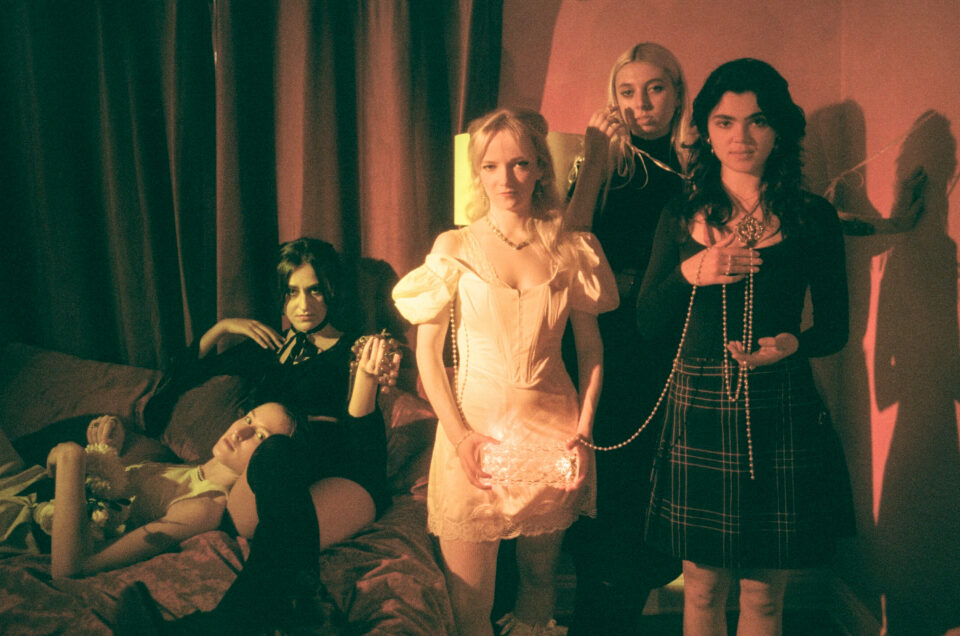
It’s an awfully charming way to look at their rise from bar band to a group selling out shows in the biggest markets the United States has to offer. But sometimes good things happen to bands that deserve it, and seeing The Last Dinner Party live at the Bowery Ballroom that night, it became instantly clear that this band deserved it.
About this group being an anachronism: It’s not just their prioritizing touring first, then securing a record deal, then hitting the studio to make their first album. There’s something beguilingly fantastic about a band—or individual artist, for that matter—building things the old way. Everything is broken because billionaires buy things, strip them for parts, and then try to convince us they never worked in the first place. Nowhere is that more prevalent than in music. Seeing a band do things differently, in a way that encourages fans to reward them with ticket and album sales, is an encouraging sign that the future of music is less indebted to the algorithm than to musicians who are really fucking fantastic at what they do. It’s idealistic, but so is an album like this one.
“It’s important that we embrace every single facet of extreme emotion because it can be so beautiful and revealing.” —Abigail Morris
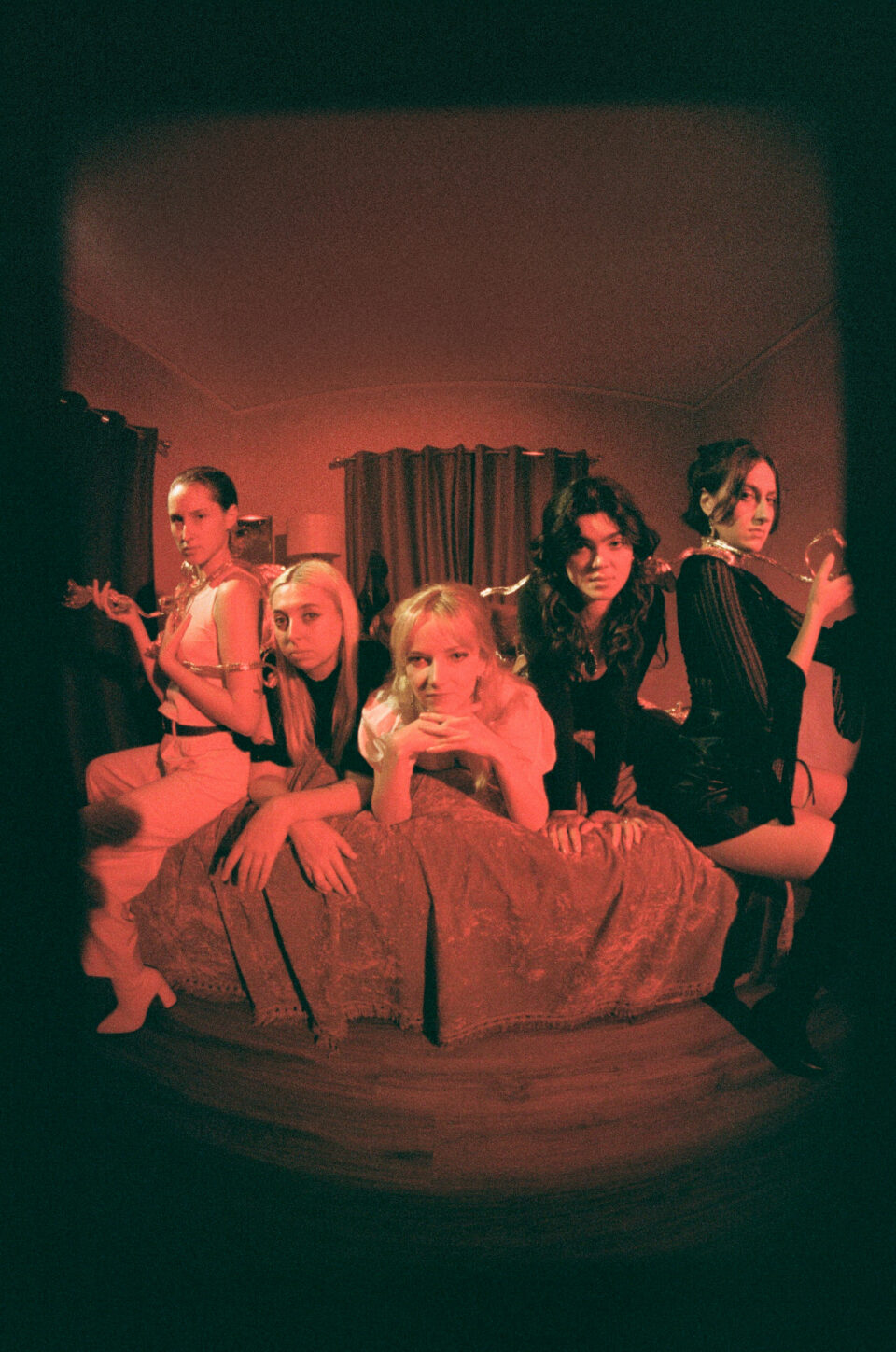
Prelude to Ecstasy is a leading title, but the band wanted to explore all facets of the hyped-up adjective, not just the sort of joy that comes alongside, say, selling out US shows or penning a hit record. “It's also the ecstatic pain and horror and fear and sadness and grief and loss alongside extreme hopefulness and love,” Morris explains. “All those feelings are so important to have. It’s important that we embrace every single facet of extreme emotion because it can be so beautiful and revealing.”
When The Last Dinner Party released their first major-label single “Nothing Matters” in April of last year, there was a bit of confusion regarding the group that shared the wildly infectious track. The song, which was circulating across streaming platforms and doing pretty well for a debut single, was getting mixed up with Robert Glasper’s Dinner Party supergroup, such that they had to change their name from “Dinner Party” to “The Last Dinner Party.” Glasper’s group happened to be hosting a Blue Note residency the same night The Last Dinner Party stopped in New York. It was only fitting. “It would be fun to talk to [Glasper] about it,” explains Roberts. “But we’re such big fans I’d probably get nervous.”
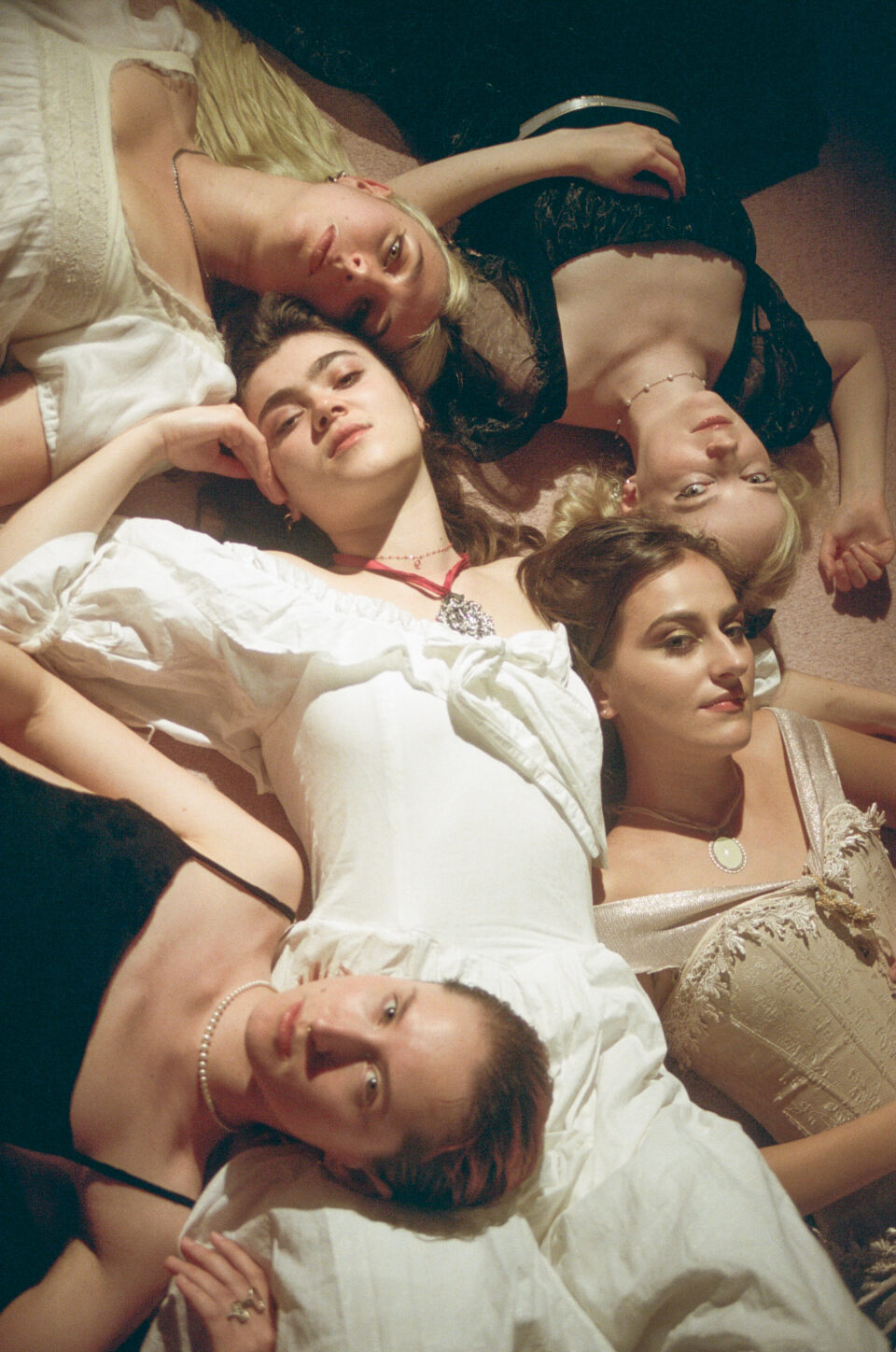
From early days opening a show for another idol, Florence + the Machine, to the surreality of building their live set with an actual budget, the band has had to fight to maintain the humility and joy that infuses their work. “I have a photo of me on my Instagram as a 10-year-old holding up a poster of Florence,” says Davies. Fast forward a little over a decade, and the group was sharing a stage with this idol, asking her for advice. “She’s had the same experience as a woman in the music industry that we have had—and she was on a similar trajectory. Hearing her story was important,” she adds.
When I spoke with the band, they were surprised that people in America cared about their music. More than the major label deal, the press, and the success, the group was bewildered that someplace not close to their hometown could become a hub for their music. “In London, I can kind of compute people knowing who we are, but in America it's like, ‘Who are you? How do you know about us?’” Morris asks with a laugh. “We were so far away. And now we’re here.”
The surreality of the moment hits her, which comes full circle a few hours later as she giggles on stage, thanking every member of the audience for making their first time in New York so special. “It’s so exciting that we’ve come this far in such a short amount of time,” she says. “It’s really lovely.”
So much of The Last Dinner Party’s first full year in the limelight has been a reckoning with success. Being an in-demand, major-label group is often glamorous. All the free shit and doting from anonymous, interested parties could break people going about this for the wrong reason. And while this Bowery Ballroom show was a victory lap, it was also a test. Could they do New York? The Island Records meetings, radio promotion, standing-room-only show, and, yes, a few hours to check out a different Urban Outfitters from the one they frequented in London? That last rhetorical may be in jest, but when I asked the band what they spent their morning doing in NYC, Morris quipped, “Exactly what we did in London: bought dumb hats at Urban.” Success simply cannot break this band. FL








